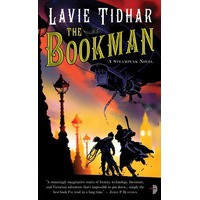 2.5 – 3 stars
2.5 – 3 starsI’m a bit torn about _The Bookman_. On the one hand it exemplifies a lot of the key elements of steampunk. One the other hand it exemplifies a lot of the key elements of steampunk. Maybe I should explain.
I’m not quite sure where I stand in regards to steampunk as a genre. In many ways it seems to me less a genre than an excuse for cosplay on the one hand and fan fiction on the other. I mean once you get rid of the goggles and corsets, the airships and gears what have you really got? Oftentimes it is little more than a writer playing with his favourite Victorian era characters/settings in a mashed up version of penny-dreadful and video game. Now let me say that I love video games, and penny-dreadfuls can be a lot of fun, but I’m just uncertain how much all of the motley elements of steampunk really meld successfully into what I would consider a genre. That said…there’s a lot of cool in the idea of steampunk which is, I guess, why it’s become so popular. Ok, let’s move on.
_The Bookman_ has a lot going for it: an interesting alternate earth where a key event in the past has changed the course of human history (namely the discovery of Caliban’s Island where a previously unknown race of Lizard people (Les Lézards) are discovered who promptly take over the British Empire, turning it into their own world-spanning government); the introduction of a race of automatons of varied origins and types who play an interesting role in the overarching story of this world; a metric (or is that Imperial?) tonne of secondary characters and references pulled from the world of Victorian (and earlier/later) fiction and history. This last could also be listed as one of the things the book has that is *not* always going for it. While it is undoubtedly great fun to play ‘name that reference’ (it’s actually one of the most enjoyable aspects of the book), it can sometimes seem to verge on being a bit much (as a writer I think you have to be careful to make sure your easter eggs don’t counterbalance the actual story, even if they are a lot of fun). Definitely got a "League of Extraordinary Gentleman" and Wold-Newton universe vibe from this stuff.
The greatest failing of the book for me, though, was the fact that the main character, Orphan, was an incredibly boring cypher. It seemed like all of his actions (those few times he did act as opposed to being pushed by circumstance or other characters) were merely the contrivance of the author to get him where he needed to be. Now granted that his mysterious and unknown background partially played into this aspect of his character and he *was* being overtly manipulated by other characters as part of the plot, so his lack of agency is perhaps understandable, but I still found him to be so uninteresting, really nothing more than a pair of eyes through which the reader could experience the author’s steampunk world, that I just couldn’t sustain any lasting interest in him. I also didn’t really buy his own personal motivations for following his quest, despite the fact that I kept being told how much he loved his lost girlfriend and wanted to reach for the remote possibility of bringing her back from the land of death. It’s weird, really. On the one hand it seems like the author wanted Orphan to be a non-traditional ‘hero’, something different (really the exact opposite) from the ready-for-action swashbuckling adventurer that the fictional inspirations for this book would have led us to expect, and yet on the other hand falls into making him simply fulfill a different stock role: the unexpected hero of low birth who discovers the secret of his true noble origins as he is thrust into the events of the wider world.
Ok, a lot of harsh there along with some damning with faint praise I guess. This book still did have a lot going for it. There were many scenes that just came off really well and were lots of fun (Orphan’s discussion with the Turk and the character of Captain Wyvern are two that stand out for me). For the most part these episodes generally involved cool secondary characters (and alternate world versions of same) from the ‘name that reference’ game, or provided a springboard for a further expansion of Tidhar’s admittedly fascinating worldbuilding. The best of these moments for my money was the point at which Orphan gets to the mysterious island of Les Lézards. This was really quite cool. I got a really ‘Lost’ (the TV series) vibe from this episode and that, coupled with the revelations presented, helped to make Orphan’s quest seem more engaging (and even did a little to make Orphan himself a bit more interesting). When we get down to brass tacks, though, Orphan’s overall story just didn’t have the same shine for me as the ‘extra’ elements of the story did.
All in all it was a fun book, but I’m still left with a sense of ambivalence about steampunk overall.






